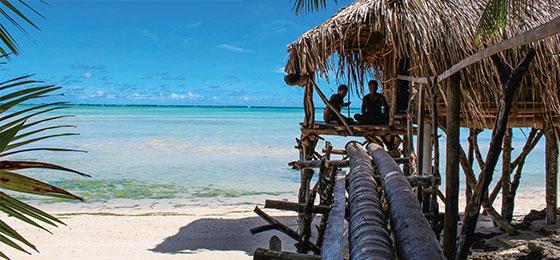English under swaying palms

Languages are constantly changing. The sociolinguist Tobias Leonhardt from the University of Bern, born in 1989, has been in the South Seas to investigate what drives these changes.
(From "Horizons" no. 111 December 2016)
Kiribati is a long way away from my university in Bern – over 9,000 miles away as the crow flies. Though you can't actually fly straight there, as you have to change planes several times, including in Australia. Air Nauru then brings you to an airport on the Tarawa Atoll. When I visited there in 2015, I travelled the last few miles in a canoe. I then spent three months with Amon, Tekinati and their children in their huts made out of palm and pandanus leaves. I call them my Kiribati family – they were so friendly and open. It didn't bother me that they didn't have any running water and only occasionally had electricity. In compensation, I joined in the 'toddy-cutting' among the coconut palm trees every morning and evening. That's what they call the procedure of cutting open the fruit in order to get the sweet-and-sour palm juice.
Amon and Tekinati speak English and were able to organise contacts with local people for me. I'm researching into how English has developed in this group of islands, both before and after the time when it was a British colony – it has been an independent state since 1979. You might think that it couldn't be a problem to find English-speaking people in a country where English is the second official language and where school students are never allowed to speak their mother tongue on school grounds. But in fact most of them can only say a few sentences, such as: "Where are you going?". But this actually means something along the lines of "How are you?"
From a South Sea paradise to an office in Bern
Hardly any foreigners come to Kiribati. There are few amenities, and there's no organised beach fun. If you're European, people notice that you're something exotic by the time you leave the main town of South Tarawa, if not before. The children cry "I-Matang, I-Matang", which means "White man, white man!". But everyone is open and happy to meet you. You're stantly getting invited to eat with people you've never seen before. So it was easy to get talking to people, and this is ultimately how I found my English speakers.
As a sociolinguist I investigate the impact of culture and society on language. This is why I tried to have conversations that were as natural as possible. For this, I used unobtrusive microphones that I was able to attach to me and to my conversation partner. We then simply talked about whatever took our fancy. I told people about the seasons and the mountains in Switzerland. And the I-Kiribati – that's what the inhabitants of Kiribati are called – told me of their lives in a society where money plays a very different role from here, where hardly anyone has an Internet connection, and where people on the whole get their food from plants or from the sea. That was incredibly interesting.
But working on my recorded material back home in Switzerland is not as colourful. Above all, I'm busy analysing how the pronunciation of Kiribati English differs from standardised forms. You have to listen to everything a thousand times in order to transcribe it properly and to extract the data from it. All the same, I already have initial findings. For example, there is an interesting pronunciation of the English consonant pairs p / b, t / d and k / g, in which the first in each pair is unvoiced and the last is voiced, such as in pea / bee, tea / dear or key / gear. In Kiribati there is in each case just one consonant that is situated somewhere between these pairs. Some people – usually the younger ones – manage to get the difference right in English. Others – mostly older people – don't.
Language and climate change
My research is one small jigsaw piece in a global description of the varieties of English found in Micronesia. I am working with other doctoral students who are gathering linguistic data on four other islands in Micronesia, also about grammar, accents and for a dictionary. In this manner we are documenting the linguistic situation in the whole region. This is important, not least because Kiribati is already under high threat from the rise of the sea levels in the region. According to some prognoses, the islands could already be completely covered in just 50 years. So one sociolinguistic question would be how this threat impacts on the language. Could it be that young people learn better English because they know that they will at some point have to emigrate to Australia or New Zealand? Perhaps our studies can at least help to awaken an awareness of an otherwise very little-known part of the Earth, and can help to develop better textbooks.
Recorded by Christian Weber.